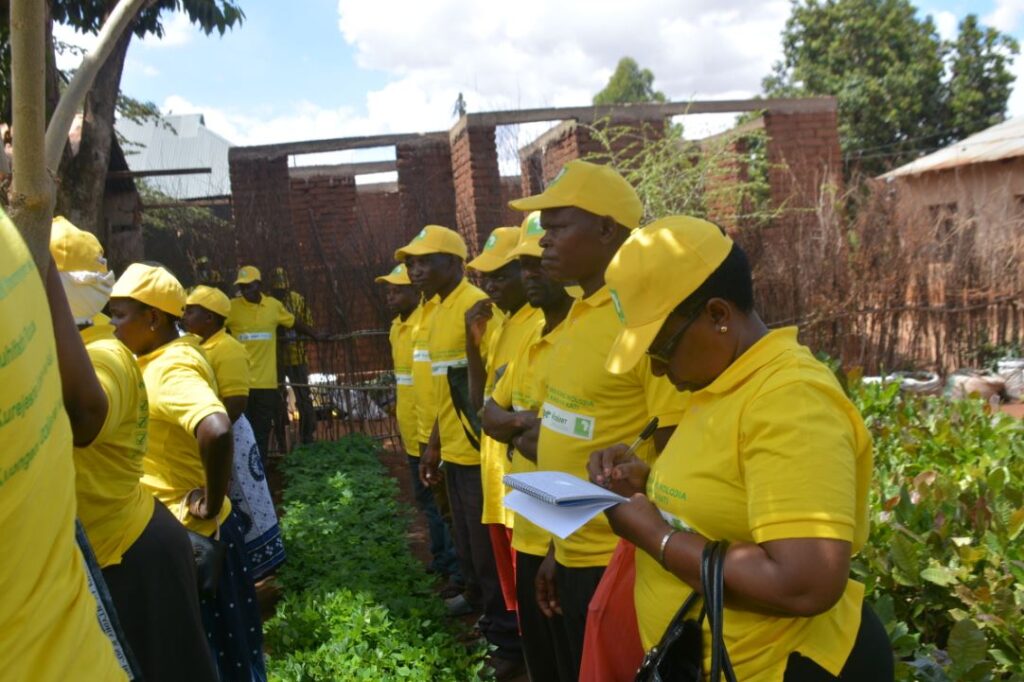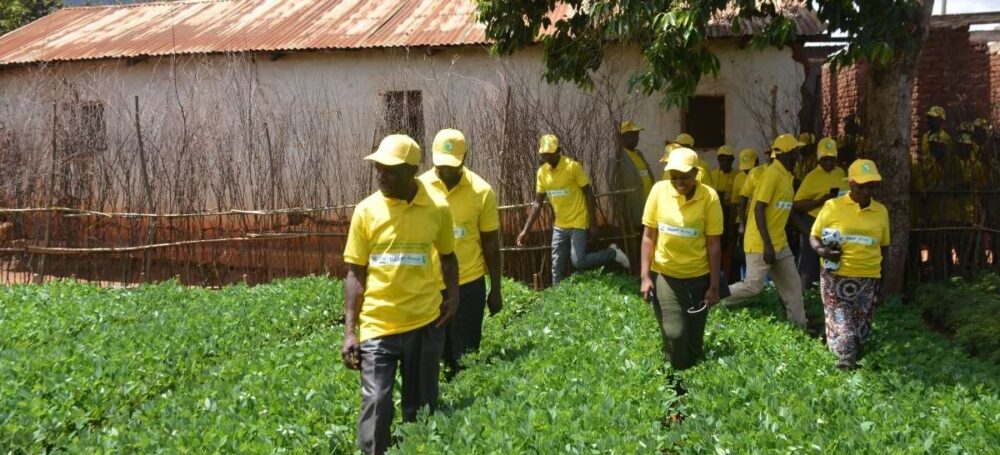Kilimo Ikolojia kwa Maendeleo Endelevu is a well-known and inspiring slogan by the rural community that implemented agroecological interventions in Kongwa District of Central Tanzania to combat land degradation and improve crop productivity. This slogan was repeated quite often by farmers during a three-day Farmers -Field Day (FFD) program that showcased agro technologies and practices introduced in the eight intervention villages in the region.
Some of the interventions were:
- Establishment of multipurpose tree nursery sites to address land degradation
- Demonstration of poultry and cattle feed processing from leaves of multipurpose trees
- Installation of Fanya Juu/Chini terraces in upland catchment areas

Dr Birhanu Zemadim Birhanu, Senior Scientist and Project Leader, called the FFD event “a learning visit that will provide an opportunity to all participants to learn, discuss and exchange ideas on how to effectively roll out the validated technologies at the landscape level.” He further mentioned that all participants are thus our ambassadors for effective and sustainable implementation of validated technologies and practices.
In his welcome address Dr Elirehema Swai, a Senior Researcher, Tanzania Agricultural Research Institute (TARI-Makutupora), introduced the purpose of the FFD, explaining, “Farmers, students and their teachers, and higher learning institution students have been invited to this event. Similarly, extension workers, local Government leaders and policy makers are also here for an in-depth understanding of the benefits of using agroecological technologies and practices in the semiarid region of central Tanzania”.
“ICRISAT has collaboratively conducted R&D work on crop improvement and seed systems for dryland crops with the government of Tanzania through collaborative agreement with them and the current project is benefitting from the fruits of this collaboration,” said Mr Peter Ngowi, Senior Scientific Officer for the project. He also said that the scale-out initiative implemented by ICRISAT, LEAD Foundation and TARI wouldn’t have been possible without the good participatory and collaborative efforts by Biovision, ICRISAT, TARI, LEAD Foundation, technocrats from Kongwa District Commission, and farmers from the eight intervention villages.
Eng. Njamasi Simon Chiwanga, Director of Programs, LEAD Foundation, informed the participants that his office was implementing a Farmer-Managed Natural Regeneration (FMNR) program under the current project by developing multipurpose tree nurseries and planting and preserving of natural vegetation. LEAD Foundation provided training programs for farmers to maintain 10 to 20 native trees per acre in their farm fields and plant multipurpose tree species such as Gliricidia sepium seedlings on the crest of Fanya Juu/Chini contour terraces.

“In the current collaborative scaling out initiative LEAD Foundation , ICRISAT, and TARI together raised about 45,000 Gliricidia sepium tree seedlings,” he explained. Participants were informed that tree seedlings from the project would be distributed free of charge to farmers who installed Fanya Juu/Chini terraces in their fields immediately on the onset of rainfall.
The Chairman of Kongwa District Council, HE Mr White Zuberi, reiterated that land degradation, mainly caused by human activities such as deforestation, overgrazing, etc. was a very serious problem. He noted that the district was no longer receiving enough rains and said, “I know these scientists from ICRISAT, TARI, and LEAD Foundation, and others from Universities for a long time for their good work that they are doing for the betterment of farmers’ lives.” Mr Zuberi further informed participants that the agroecological project had come at the right time. “It is an effort all farmers, leaders at all levels must embrace and push to ensure that we succeed in alleviating land degradation and improve crop productivity.”
HE Sina Mbenegalo Mude, Ward Councilor, Nghumbi village, said, “The usefulness of the project and its success depend, among others, on our commitment as leaders to be good examples, to be the first to have the technologies and practices implemented in our farm fields to be emulated by the rest of the farmers.”
The Guest of Honor, Ms Aziza Mumba, Assistant Regional Administrative Secretary, Dodoma City, commended the work done by the project and conveyed her special thanks to the donor and all participating institutions. She further noted that the outcomes of the project would benefit local communities that face the challenges of recurrent drought and soil erosion. She urged all project partners to work together and address the issue of difficult access to improved seeds. Subsequently, she requested the participants to take full advantage of the event to learn all that they could, so that they could improve their agricultural productivity as well as change their livelihoods.
The FFD concluded with a feedback session where the guest of honor and invited participants shared their observations and the key lessons to be taken forward. During the discussion, various challenges facing the agricultural sector across diverse semi-arid areas of Kongwa were identified.

Proposed solutions and the respective institutional commitments:
For farmers: Farmers have been advised to be good ambassadors at their home villages by ensuring implementation of agroecological technologies and practices they have learned and pass the knowledge on to their fellow farmers.
For the government: In order for the technologies and practices to be successfully and sustainably rolled out to different agroecologies and new geographies, the government, through its relevant authorities, should enact bye-laws to be abided by local communities at different levels, starting from sub-village level. The government should support development organizations in their efforts for sustainable agroecological interventions. In addition, government leaders at all levels should set up demonstration fields and learning fields in different villages under the guidance of extension workers and/or lead farmers to ensure smooth transfer of technologies and practices.
For Development Organizations (DOs): DOs were advised to scale out the project outcomes to other regions and expand platforms at different levels to effectively interact and share experiences on agroecological practices.
The FFD was organized during 20-22 December 2021 at Mlali village, Kongwa district, under the Biovision Agroecological Project led by ICRISAT and its key implementing partners TARI-Makutupora, and LEAD Foundation. It brought together a wide range of stakeholders – farmers, local government leaders, researchers and development actors from ICRISAT, TARI and LEAD foundation, extension officers and village leaders.
A total of 469 (208 female and 261 male) participants attended the FFD.



Comments are closed.